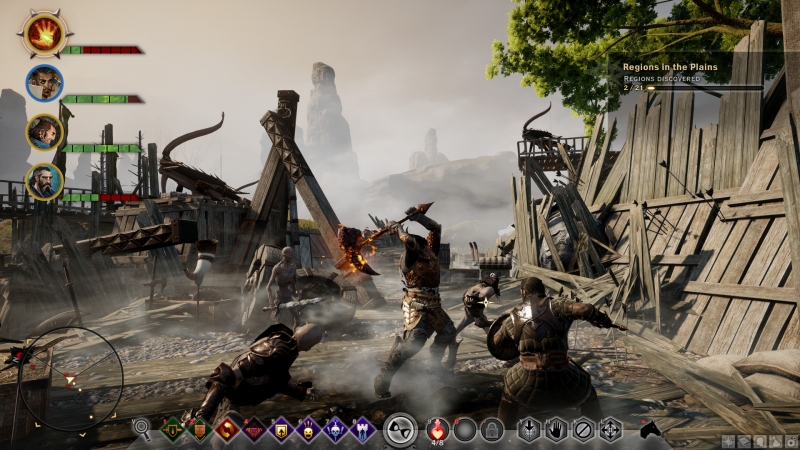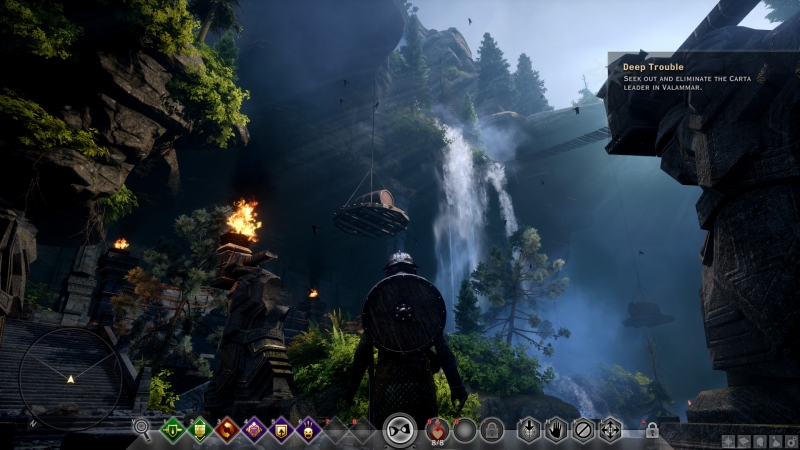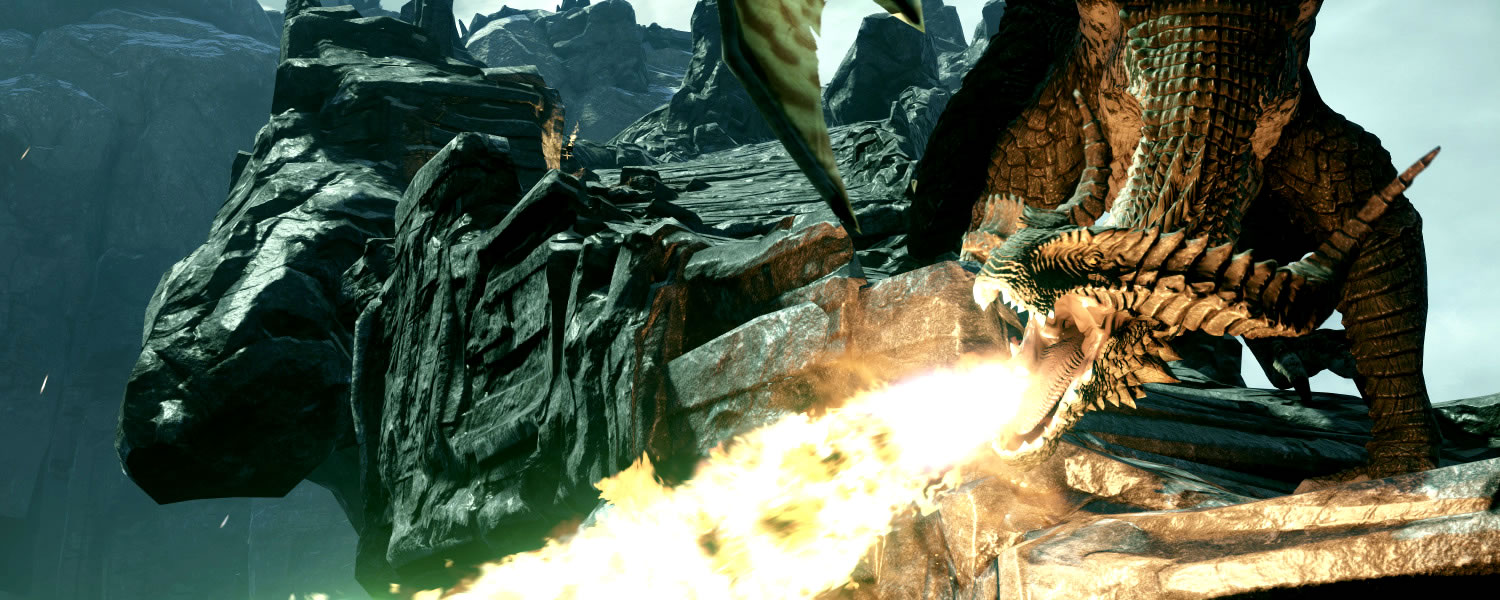Since I joined TechSpot, I haven't done a whole ton of gaming content. But when EA and BioWare invited me to a private hands-on session for one of the most anticipated games of the year, I couldn't resist. Not only is the series one of my personal favorites, but a break from the usual schedule of smartphone reviews is always welcome.
Dragon Age: Inquisition is third main title in BioWare's action RPG series, and it's a much more expansive and ambitious game than those that came before it. Part of this is explained because it's launching on 'next-gen' consoles, and part of it is thanks to the use of DICE's Frostbite 3 engine. Another factor is simply that Creative Director Mike Laidlaw wanted this game to finally realize the vision for Dragon Age.
I was one of the lucky few at EA's event to test the game on PC (instead of PlayStation 4), and the first thing that struck me was how unbelievably good it looked. The graphical detail on Ultra settings is jaw-dropping: everything from the particle effects, to the lighting, to the textures looks incredible. It is easily the most visually astounding RPG game I have ever played.

Graphics aren't everything though. I was most curious to see how fun Inquisition is to play, and to see whether I could feasibly sit down and play the game for weeks on end, exploring the vast in-game world and it's plethora of content. Laidlaw mentioned that for a completionist like myself, you'll need to spend at least 100 hours in control of your four-person party to really see everything.
Your first task upon firing up Inquisition is to make a character, who, after a short time into the game, becomes the Inquisitor. The protagonist is different from previous Dragon Age games, though there are many familiar characters and settings scattered through the game that will please fans of the series. You're then put through a Prologue sequence that brings you up to speed on what's going on in the fictional world of Thedas, and how you come to be part of the Inquisition.
One of the few negative things that I can say of Inquisition is that the opening sequences are very overwhelming. Not only is the combat and control system on PC difficult to immediately grasp, but as someone who doesn't remember much of the story of past Dragon Age games, I found it hard to figure out what was going on, and how the story relates to past titles. A few hours in, though, and you'll feel comfortable in the world of Inquisition.
Speaking of the combat system, BioWare has listened to fans disappointed by Dragon Age II and implemented a revised system that's more reminiscent of Origins (the first game in the series).
Inquisition features a combination of third-person hack-and-slash-style combat with a tactical view, the latter of which pauses the game and allows you to assign commands to members of your party. With multiple ways to control the game it can be tricky to immediately master, but after a few hours in Inquisition it felt like I had a grasp of how each system functioned at a basic level.

The beauty of Inquisition's combat system is that you have so much control over how battles play out. You can start by attacking enemies with your unique skill set in third-person mode, switch to Tactical View to plan how your allies should efficiently tackle the situation, and then regain live control to satisfyingly hack-and-slash. Combined with special moves, potions, looted items, and the ability to switch between members of your party during combat to harness their abilities, Inquisition impressed me with its rich combat system.
It's not just the combat system that feels rich and well-designed: the game world is so deep that three hours of gameplay is not even close to being enough to explore what's on offer. There's quests left, right and center, NPCs everywhere to meet and greet, and romantic relationships to foster. There's crafting, there's skill trees, there's a massive list of attributes, and a world chocked full with lore.
The size of the map has been increased significantly, but it's not completely open world. Thedas is split up into multiple expansive areas, each with a set of things to explore, people to meet, and quests to undertake. The idea is to condense the world into areas that are rich, detailed and entertaining, removing boring and lengthy sections of interconnecting roads with a fast travel system, as a BioWare employee explained to me at the event.
But don't be fooled into thinking the game world is small: the one huge open section of Thedas I spent time in was larger than the entirety of Dragon Age II. And apparently there are multiples of these areas to explore as time goes on. Even if it's not truly 'open world', I welcome the change to an expansive setting that's far less linear than previous Dragon Age games.

Decisions that you make through dialogue and actions throughout Inquisition will have a significant impact on how the game progresses. Mike Laidlaw, Dragon Age's Creative Director, was telling me that depending on which path you go down, the content and world around you will shift and change. Reactions from certain people in game will also be different depending on the race of your character, something you'd expect in real life.
But is the game fun? Definitely. Across my three hour experience I slaughtered enemies, activated special abilities, explored the game world, started quests, and met many characters including some familiar ones, all while enjoying myself. And that's without diving too deep into combat tactics, the loot system, decision making and multiplayer, all which will add new and exciting experiences to Inquisition.
In fact, as I sit here writing this preview article, I wish I was playing Inquisition. It's set to enthral me for countless hours when it launches on November 18 (in North America) on PC, Xbox One, PlayStation 4, Xbox 360 and PlayStation 3.
The Technical
As an avid PC gamer, I was curious as to how optimized Inquisition would be on the platform. The systems at the event were powered by AMD Radeon R9 290 GPUs (I was told), enough to render the game at 1080p, Ultra graphics settings with 2x MSAA at around 40 FPS. Combined with some motion blur the game is playable at this quality and on this hardware, though personally I'd turn down some of the settings to achieve smoother gameplay. (Note that new GPU drivers will almost certainly improve performance come launch.)
Inquisition was built from the ground up on all five launch platforms; that's to say, the PC version is not a port. A BioWare employee informed me that the team was producing up to 16 builds of the game per day, ensuring it was optimized on PC along the way. While the Frostbite engine does scale well allowing those with lower-end systems to play, if you want to crank it all the way to achieve a stunning level of fidelity, you'll need a top-end single GPU.

As a couple of other side notes, there are lots of graphics options for the PC version, allowing you to fine tune the level of fidelity. Mantle will be supported in Inquisition as well, for those with AMD systems (it wasn't ready for the preview), and BioWare tells me that there are no stupid limitations on the PC version: that means no FPS cap, no resolution cap, and even (potential) support for triple-monitor gaming.
Compared to the PS4 version on the other side of the room, the PC version looked superior. That's not to say the console version looks bad; in fact it looks pretty awesome for the limited hardware that's found inside. But you'll undoubtedly get the best experience on PC, with enhanced textures, better lighting and more of the awesome particle features of the Frostbite engine. You also get access to the advanced mouse-optimized interface on PC, rather than the simplified hack-and-slash focused UI on consoles.
The only thing that's been scaled down across the versions of Inquisition is graphics. Unlike Shadow of Mordor, which loses the Nemesis system on last-gen consoles, Inquisition will have gameplay parity on all platforms. This includes on-screen NPC and enemy counts, as well as the size of the map.
The BioWare team also spoke passionately about how collaborative the effort was to build Inquisition on the Frostbite engine. Now that many of EA's projects are using it, teams focusing on different projects were able to lend code to BioWare for systems within Inquisition. This includes the Need for Speed team; Inquisition apparently features some Frostbite code segments developed by the people working on racing games.
Of all the games coming out this holiday season, I was most looking forward to Dragon Age: Inquisition. Now that I've played the opening hours and spoken to some of the people who made the game happen, I can't wait to absorb myself in what looks to be a game of the year contender.
